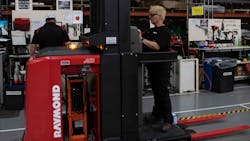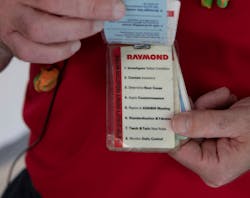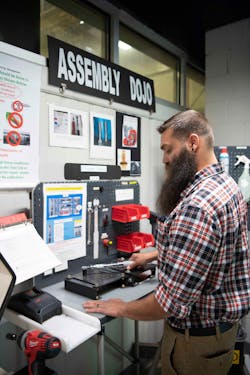IW Best Plants Winner: Problem-Solving Culture Propels Raymond Corp.
It’s a sunny July morning, and this IndustryWeek editor is at The Raymond Corp. in Greene, New York, home to both the company’s headquarters and large manufacturing site. The maker of forklift trucks is celebrating its 100th anniversary in 2022, and on this day the large, airy building lobby is dominated by multiple, impressive interactive exhibits showcasing many of the historical milestones, people and innovations that have contributed to the company’s century-long run. Clearly, The Raymond Corp. knows something about longevity.
The goal of my visit is straightforward: Observe up close and personal the secrets to Raymond’s stellar performance on the factory floor in Greene. Because perform is what it does, across a host of metrics. The Greene site delivers enviable first-pass quality yields, shows strong evidence of continuous improvement (double-digit reductions in OSHA recordable incidence rates, for example), enjoys low employee turnover and has solid workforce engagement.
Moreover, it has demonstrated an ability to accomplish arguably an even tougher task—sustaining its performance gains over time. Indeed, IndustryWeek has presented The Raymond Corp.’s Greene site with IW Best Plants Awards twice previously, in 2018 and 2014.
Nor is the secret a continuous improvement guru who singlehandedly races around performing acts of operational excellence.
Instead, the secret, it turns out, is no secret at all. Michael Field, Raymond Corp. CEO, describes it simply: reinforcing the fundamentals. “You have to keep repairing it, just like a bridge,” he explains. It’s making that happen over and over again that presents the challenge.
A Learning Organization
Fundamentally speaking, the Toyota Production System underpins operations at Raymond’s vertically integrated Greene manufacturing site—not surprising, given that Raymond is a Toyota Industries company.
At the Greene site, reinforcing the fundamentals could be described as “always be learning,” supported by a structured approach to continuous improvement. Moreover, Raymond works diligently to engage all employees in these efforts, and the impact is clearly evident on the plant floor. For example:
The Greene manufacturing site has a robust kaizen program, with more than 6,100 kaizen suggestions recorded in 2021, 94.5% of which were implemented.
Kaizens typically are individual efforts by employees to improve their own processes, and with participation comes opportunity for monetary rewards and enhanced individual performance ratings. During my visit, the plant presented the Kaizen Award Winner of the Month. The CEO was among the leaders in attendance in the welding department where the award was presented.
To hear more from Raymond and other IW Best Plants winners, attend the Manufacturing & Technology Show from Oct. 18-20 in Cleveland. All four winner's of this year's awards will participate in a panel discussion on Oct. 19 to discuss how they approach continuous improvement and strive toward manufacturing excellence.
“We are challenged out of the gate to embrace continuous improvement, to not be timid about saying, ‘I have an idea,’” says Brandon Van Hoesen, a QCC (quality control circle) specialist.
Examples of implemented kaizen suggestions at the Greene factory include relocating a tool board for more direct and convenient access by the operator, restructuring an assembly process to improve ergonomics and working with a supplier on a paint process that led to reduced emissions.
Kaizens are a structured process, and so too are quality control circles. Unlike kaizens, QCCs are team-based, small groups of hourly associates who work together to solve an issue in their work area. While there is a facilitator, the group is self-guided and learns problem-solving tools with which to address the issue. They meet for 30 minutes a week over a set period of time and follow an eight-step QCC process.
Interestingly, the primary focus of the QCC is “human resource development,” in the words of The Raymond Corp. In other words, the manufacturer’s goal is to develop a team of problem-solvers.
“Raising the knowledge of the workforce,” is a win both for the individual and the company, says Field.
Raymond had 44 active quality control circles in 2021.
Wait, There’s More
Suddenly it’s 2:30 p.m. in Greene, and at The Raymond Corp. the daily 15-minute “Yuichi” or afternoon meeting gets underway in the Asaichi room. In rapid-fire fashion, line managers and the director of operations take turns sharing updates on production results, discussing downtime issues and adjusting build schedules as needed. They speak in what sounds to this outsider like some strange language known only to them. A similar 15-minute meeting occurs every morning. The focus of the morning, or Asaichi, meeting, however, is reviewing defects and disruptions, as well as root causes and countermeasures.
These get-togethers are routine, matter of fact. And boom, just like that they are done, and everyone moves on to whatever step is next in their daily cadence of keeping product shipping out of the Greene site.
What’s Next?
Innovations in the material handling industry have delivered a century of growth at The Raymond Corp., and CEO Field is very clear that innovation is its future as well. The Greene team is betting on a workforce of problem-solvers to sustain that vision.
The Raymond Corporation
Greene, N.Y.
Employees: 1,733
Total Square Footage: 667,206
Primary Product: forklift trucks
Start-up Date: 1922
Achievements: 94.5% of improvement suggestions from employees were implemented in 2021; 41% reduction in OSHA recordable injury and illness incidence rate in past 3 years; ISO 14001 certified; overall quality yield has improved by 35% in the past 3 years
About the Author
Jill Jusko
Bio: Jill Jusko is executive editor for IndustryWeek. She has been writing about manufacturing operations leadership for more than 20 years. Her coverage spotlights companies that are in pursuit of world-class results in quality, productivity, cost and other benchmarks by implementing the latest continuous improvement and lean/Six-Sigma strategies. Jill also coordinates IndustryWeek’s Best Plants Awards Program, which annually salutes the leading manufacturing facilities in North America.
Have a story idea? Send it to [email protected].



